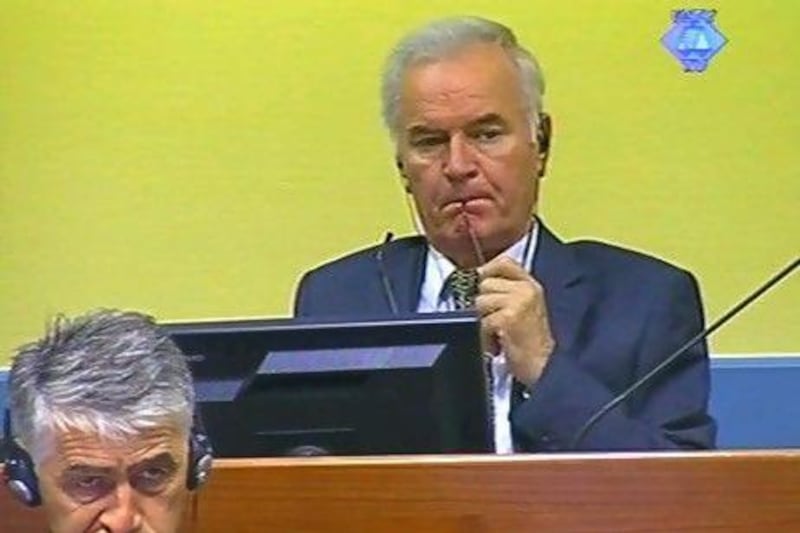THE HAGUE // The first witness in the long-awaited trial of former Bosnian Serb military chief Ratko Mladic testified yesterday, describing a harrowing escape and scenes of horror in his home village, despite a motion by defence lawyers to adjourn the war crimes case for six months.
UN judges said the prosecution could respond to this latest request for a delay today, and allowed Elvedin Pasic to testify.
Mr Pasic, a Muslim, told how his family was separated as his village, Hvracani in northern Bosnia, was being shelled in 1992 by Bosnian Serb troops under Mr Mladic's command. Only 14 years old at the time, Mr Pasic described weeks of wandering with his mother and how they were turned away from village after village.
Now 34, Pasic spoke in English, carefully describing how months later, he and his mother eventually circled back to their home village, despite a warning from Serb soldiers patrolling nearby who told them: "There is nothing for you to go back to. Your home is Turkey, this is Serbia."
He described his excitement as they entered the village anyway. He raced to his family house - only to find the soldiers had told the truth about there being little to return to.
"The house was burnt completely: the fridge, the televisions, the walls - what was left of the walls was stripped," Mr Pasic said. Even a stash of clothing they had buried had been found and taken.
Mr Pasic's voice choked with tears as he described how he had hoped to find his pet dog alive - but it had been shot where it was chained.
Most of the handful of people who had remained in his village, notably an elderly religious man whom Mr Pasic knew, had been burnt alive in their homes, he said. One was shot instead.
Mr Pasic also told how his family had been captured by Serb soldiers. He said he was so scared that he gave up his final chance to say goodbye to his father.
The women and children had been separated from the men, then marched to a school in the nearby village of Grabovica.
Mr Pasic's father and uncle had insisted he go with the women and children, he told the court - and that had saved his life.
"At first I didn't want to go but my father said, 'Get up'. My uncle insisted and he said, 'Get up. You'll survive'. I was the last boy from our group," Mr Pasic told the judges.
In Grabovica, the women and children were held in a classroom. Later the same night, the male prisoners arrived.
Mr Pasic had a final chance to say goodbye to his father, who was being held captive in a different classroom, but he did not go because he was afraid that he would give away his father, who earlier told the soldiers he had no family.
"I was afraid. I didn't go. I wish I went, I wish I went," said Mr Pasic, before breaking down in tears.
The next morning, the women and children were forced to run for a waiting bus by angry Bosnian Serbs who screamed at them and beat them with sticks.
As the bus pulled away, "I turned around - I will never forget it - on my right, on the second floor, there was a hand [of one of the male prisoners] waving".
The men were never seen again, the victims of a massacre. "I still see that hand in my dreams," said Mr Pasic.
Mr Mladic's lawyers claimed in their written filing demanding more time to prepare that trial judges recently changed the rules governing what documentary evidence the prosecutors can file. They said the changes would let them file significantly more evidence than previously allowed.
Mr Mladic's trial began on May 16, but was almost immediately halted because prosecutors admitted an apparent clerical error meant they had failed to disclose thousands of pages of evidence to defence lawyers.
Mr Mladic faces 11 charges of genocide, war crimes and crimes against humanity. He denies any wrongdoing.






